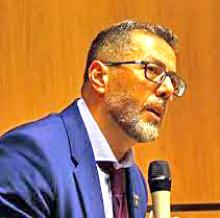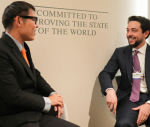You are here
Neocons are back and their ‘vision’ is darker than ever
Dec 23,2015 - Last updated at Dec 23,2015
John Bolton is a tarnished character. The once US ambassador to the United Nations is now promoted as a “scholar” in the pro-Israel lobby group the American Enterprise Institute (AEI).
Bolton is not a peace maker nor, in his defence, did he ever try to appear as if one.
When he was appointed as US ambassador to the UN by George W. Bush, his stint lasted for only one year, starting August 2005.
His time in this position was marked by discord and conflict.
He stole the limelight with statements such as: “The [UN] Secretariat building in New York has 38 stories. If it lost 10 stories, it wouldn’t make a bit of difference.”
When the Iraq war failed to achieve any of its objectives, thus signalling an American retreat in the Middle East, neoconservative politicians like Bolton retreated to their rightwing, neoconservative institutions.
Those who did not have one, established an organisation of their own and began issuing press releases at random, hailing Israel at times and chastising President Barack Obama for one thing or another.
When the so-called Arab Spring happened, neocons like Bolton saw in it an opportunity, but one that was difficult to discern.
On the one hand, they understood little of the mechanisms that propelled popular action, for they are used to operate at the highest level of power with total disconnect from the people.
On the other hand, it was clear for them from the start that Obama was taking no chances by stepping back into a Middle East quagmire that was originally designed by his predecessor.
Unable to effect much change in the region, as they once envisioned under the leadership of the likes of Richard Perle and his Project for the New American Century (PNAC), the neocons mounted a strategy predicated mostly on discrediting their administration’s lack of strategy.
In a sense the Arab Spring invigorated the neocons, but also reminded them of their political impotence.
Gone were the days when foreign policies were concocted by neoconservative think tanks such as the Washington Institute for Near East Policy (WINEP), the Centre for Security Policy (CSP) and the Jewish Institute for National Security Affairs (JINSA), of which, among others, Perle is an active member.
In fact, Perle is quite a cherished member of the AEI, from where Bolton often pitches his occasional articles in mainstream US media, offering a “vision” of how to take on Iran, how to reform Arab states and how to redraw the map of the Middle East in ways that are beneficial to US foreign policy interests.
The latest of such intellectual charges by Bolton was published in The New York Times on November 24.
Under the title “To defeat ISIS, create a Sunni state”, he theorised once more, raging against “Obama’s ineffective efforts” to destroy Daesh and demanding, instead, a “clear view shared by NATO allies”.
The main drive behind his logic is that once Daesh is destroyed, the region that the militant group designated as a “state” should be turned into a Sunni state that, as a working title, he called “Sunni-Stan”.
Bolton’s reasoning is as predictable as it is arrogant.
It is predictable in the sense that, like other past neocon initiatives, it has no respect for the wishes of the people of the Middle East.
His arguments are constructed upon the same world view that sees conflict as an opportunity and warring nations as pawns in a larger game aimed at subduing people to achieve “security” and “stability” for the US and its supposed allies.
It is arrogant for the obvious reason that he believes the world should be designed to fit the narrow, self-serving and often violent visions of failed politicians like himself, who, alas, have access to the US’ most respected newspapers.
Bolton’s conceit has completely blinded him to the failures of the Bush administration and the entire collapse of the neoconservative’s intellectual discourse during and following the Iraq war. On the contrary, he is asking to repeat exactly what went wrong in Iraq.
“As we did in Iraq with the 2006 ‘Anbar Awakening’, the counter-insurgency operation that dislodged Al Qaeda from its stronghold in that Iraqi province, we and our allies must empower viable Sunni leaders, including tribal authorities, who prize their existing social structure,” he wrote.
Only an unreasonable person cannot appreciate how the sectarian seed that the US has sowed in Iraq, based on the recommendations of the likes of Bolton, resulted in the disfiguring of the Iraqi nation.
This massive tampering with the social, cultural, religious and political fabric of society — by first empowering the Shiite and oppressing the Sunnis, then turning the Sunnis against one another, and so forth — has paved the way for unity among various Sunni groups, which ultimately formed Daesh.
It is Bolton’s and his peers’ grand experimentations that made Daesh the “state” that it is today, which he is proposing to replace with yet another sectarian state, thus slicing up two Arab countries that were once the seats of the two most prominent caliphate civilisations in history, the Abbasid and the Umayyad.
But for what purpose and at what price?
If meddling at a relatively small scale has turned the Middle East into a perpetual inferno, and roped in regional and international rivals into a war that seems to be in constant expansion, one can only imagine what such a large-scale reconfiguration of the region could lead to.
And for what?
So that Bolton can ensure the complete dismantling of the region in favour of Israel and that a buffer state can be established to block the Iranian influence in Syria and Lebanon?
So that his country could gain access to more oil supplies?
So that Russia’s attempt at having a stake in the future Middle East would be thwarted?
Whatever it is, the neoconservatives should never be allowed access to the Middle East discourse, and their visions, those of doom and destruction, should remain confined to their ever -mushrooming think tanks.
True, it is the perpetual war and horrific rivalries in the Middle East that have finally empowered the neocons to stage a comeback, but considering the damage these groups have already done, one is certain that no good can possibly come from Bolton and his clique.
The writer, www.ramzybaroud.net, has been writing about the Middle East for over 20 years. He is an internationally syndicated columnist, a media consultant, author of several books and the founder of PalestineChronicle.com. His books include “Searching Jenin”, “The Second Palestinian Intifada” and his latest “My Father Was a Freedom Fighter: Gaza’s Untold Story”. He contributed this article to The Jordan Times.













